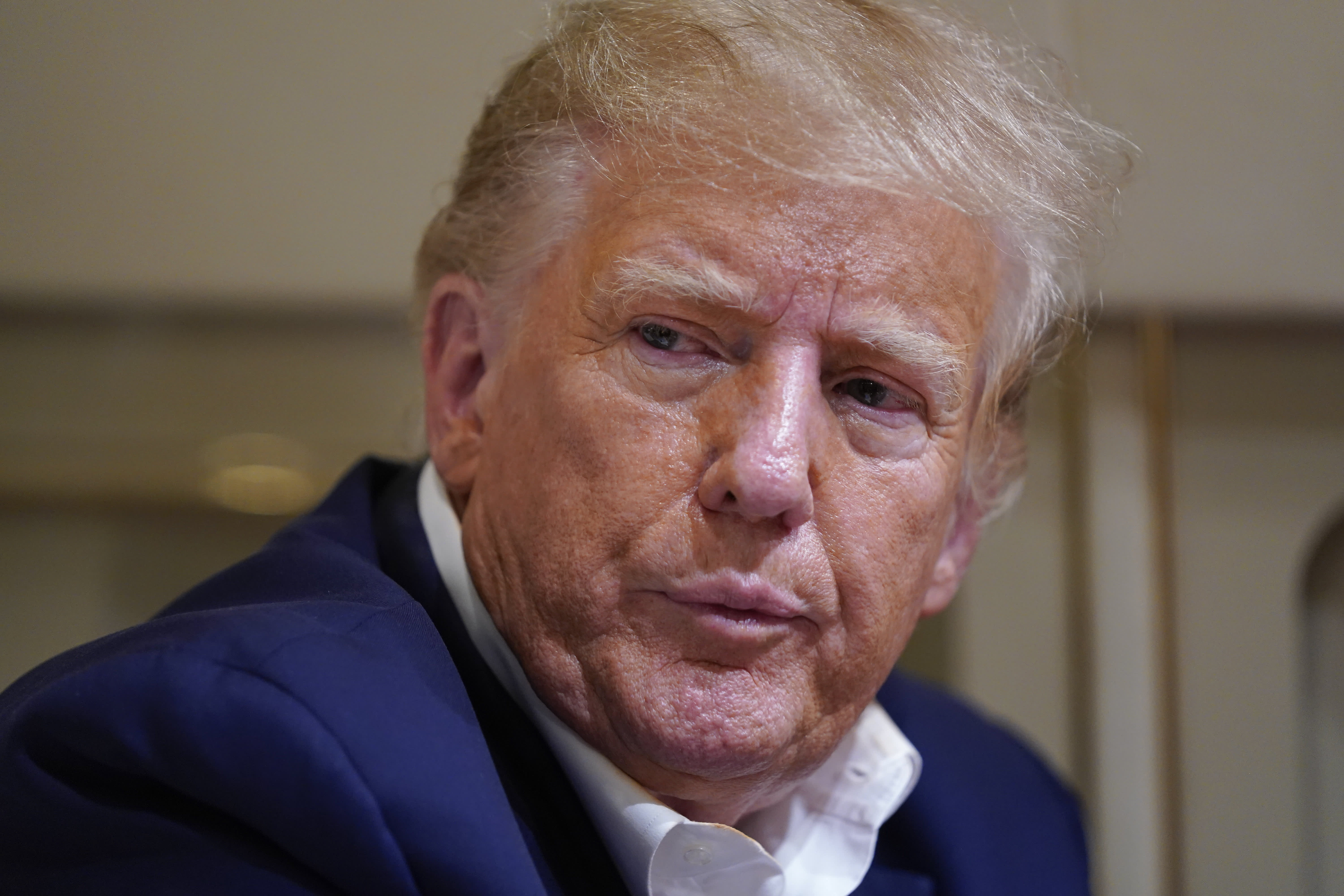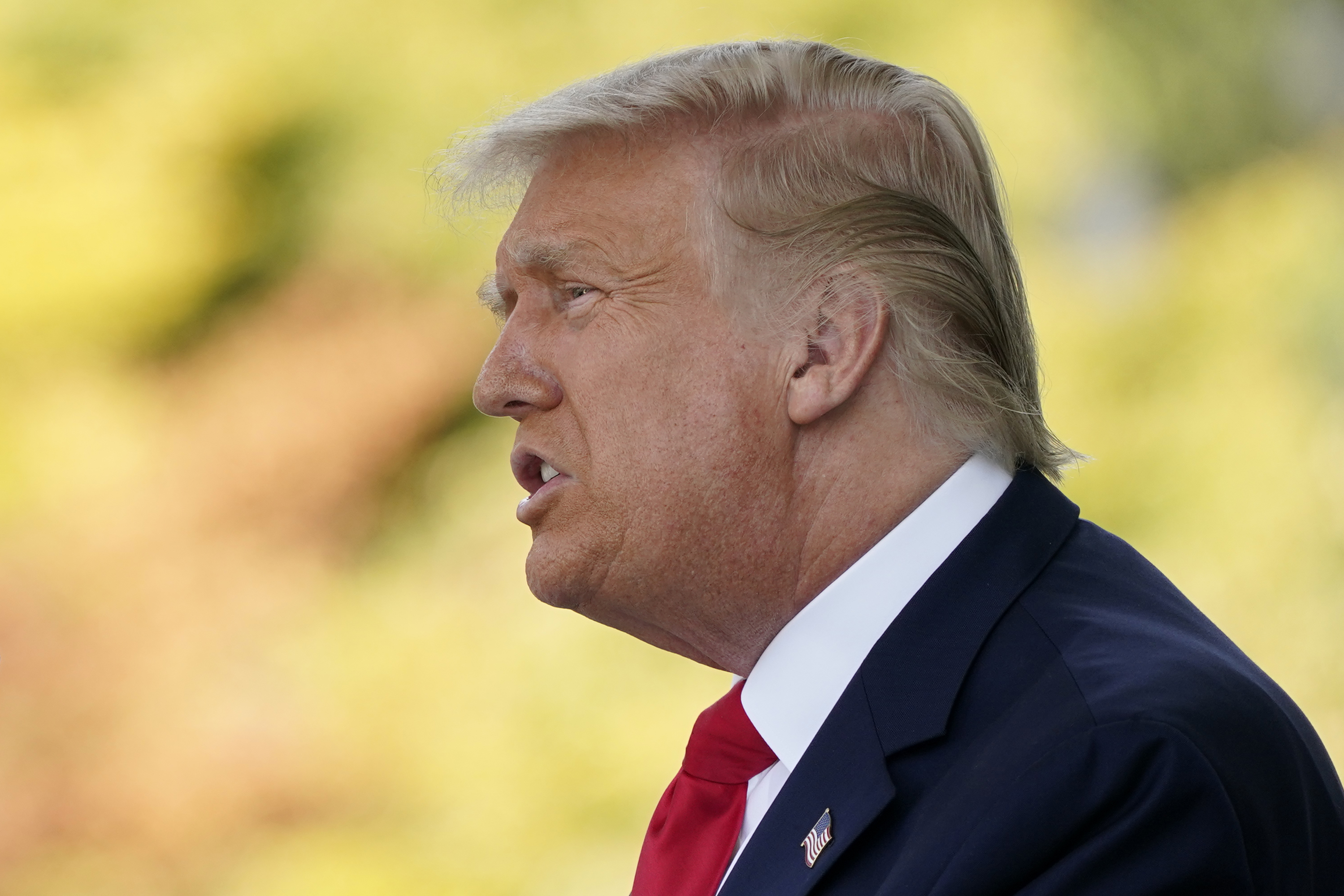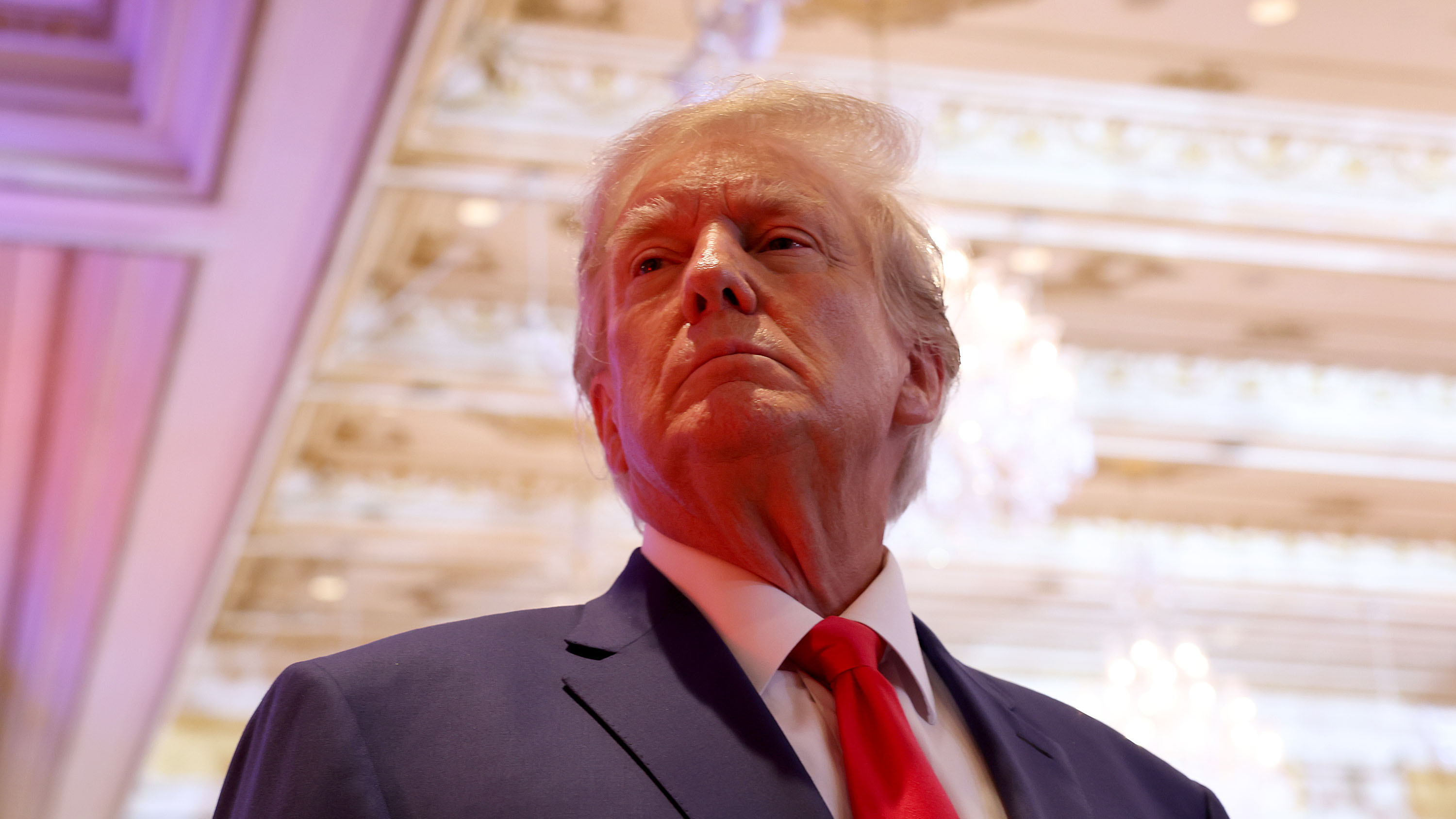After hearing evidence in secret for weeks, a Manhattan grand jury has voted to indict former President Donald Trump over hush-money payments made on his behalf during his 2016 presidential campaign.
An indictment of Trump, who is seeking the White House again in 2024, is an unprecedented moment in American history, the first of its kind against a former U.S. president.
Law enforcement officials had been bracing for protests and the possibility of violence after Trump called on his supporters to protest ahead of a possible indictment, though little in the ways of protests had taken shape.
Get DFW local news, weather forecasts and entertainment stories to your inbox. Sign up for NBC DFW newsletters.
The indictment could also test a Republican Party already divided over whether to support Trump next year, in part due to his efforts to undermine his 2020 election loss.
Trump denies any wrongdoing and has slammed the Manhattan district attorney's office probe as politically motivated.
Here's a deeper look into the hush-money probe, grand jury process and more:
WHAT WAS THE PROBE ABOUT?
The grand jury had been probing Trump’s involvement in a $130,000 payment made in 2016 to the porn actor Stormy Daniels to keep her from going public about a sexual encounter she said she had with him years earlier. Trump lawyer Michael Cohen paid Daniels, whose real name is Stephanie Clifford, through a shell company before being reimbursed by Trump, whose company, the Trump Organization, logged the reimbursements as legal expenses.
Earlier in 2016, Cohen also arranged for former Playboy model Karen McDougal to be paid $150,000 by the publisher of the supermarket tabloid The National Enquirer, which then squelched her story in a journalistically dubious practice known as “catch-and-kill.”
Trump denies having sex with either woman.
Trump’s company “grossed up” Cohen’s reimbursement for the Daniels payment to defray tax payments, according to federal prosecutors who filed criminal charges against the lawyer in connection with the payments in 2018. In all, Cohen got $360,000 plus a $60,000 bonus, for a total of $420,000.
Cohen pleaded guilty to violating federal campaign finance law in connection with the payments. Federal prosecutors say the payments amounted to illegal, unreported assistance to Trump’s campaign. But they declined to file charges against Trump himself.
Manhattan District Attorney Alvin Bragg’s team had been looking at whether Trump or anyone committed crimes in New York state in arranging the payments, or in the way they accounted for them internally at the Trump Organization.
BUT CAN A FORMER PRESIDENT EVEN BE INDICTED?
In a word, yes. Longstanding Justice Department policy prohibits the federal indictment of a sitting president, but Trump, two years out of office, no longer enjoys that legal shield. And the New York case is not a federal probe anyway.
WHAT IS A GRAND JURY?
A grand jury is made up of people drawn from the community, similar to a trial jury. But unlike juries that hear trials, grand juries don’t decide whether someone is guilty or innocent. They only decide whether there is sufficient evidence for someone to be charged. Grand juries exist in the federal court system and in many states.
Proceedings are closed to the public, including the media. There is no judge present nor anyone representing the accused.
Prosecutors call and question witnesses, and grand jurors can also ask questions. In New York, the person who could be indicted may ask for a certain witness, though it's up to grand jurors.
New York grand juries have 23 people. At least 16 must be present to hear evidence or deliberate. Twelve have to agree there is enough evidence in order to issue an indictment. The grand jury may also find there is not enough evidence of a crime or direct the prosecutor to file lesser charges.
Centuries-old rules have kept grand juries under wraps to protect the reputations of people who end up not being charged, to encourage reluctant witnesses to testify, to prevent those about to be indicted from fleeing and to guard against outside pressure.
Grand juries have long been criticized as little more than rubber stamps for prosecutors. Former New York Judge Sol Wachtler famously said that prosecutors could convince a grand jury to “indict a ham sandwich.” Defenders of the process say it is a crucial safeguard against politically motivated prosecutions.
INDICTMENT VS. ARRAIGNMENT — WHAT'S THE DIFFERENCE?
According to the Department of Justice, when a person gets indicted, they "are given formal notice that it is believed that they committed a crime." That indictment informs them of the charges they face and other basic information.
An arraignment is the accused individual's first appearance in front of a judge to face the charges. The person will be fully informed of the charges and what rights they have going forward (rights to a trial, an attorney, etc.). They can then enter a plea of guilty, not guilty or no contest (otherwise known as Nolo Contendere).
Before a plea is entered however, the accused person and the prosecutors can reach a plea agreement to settle the case before a trial starts. Otherwise, the defendant pleads not guilty or no contest, and a trial date will be set.
A spokesperson for the Manhattan DA's office said that they have been in contact with the Trump team to coordinate his surrender for the arraignment. The date of the arraignment is not yet known.
WHAT HAS TRUMP BEEN CHARGED WITH?
Unclear as of now. Legal experts say a case could be made that Trump falsified business records by logging Cohen’s reimbursement for the Daniels payment as legal fees. But that’s only a misdemeanor under New York law — unless prosecutors could prove he falsified records to conceal another crime.
Mark Pomerantz, who led the investigation under then-District Attorney Cyrus Vance Jr., wrote in his recent book “People vs. Donald Trump: An Inside Account” that in 2021, he looked into whether Trump could be charged with money laundering or if Trump had been somehow extorted.
David Shapiro, a fraud risk and financial crimes specialist and former FBI special agent, said a potential case against Trump could be “especially difficult” when it comes to proving his intent and knowledge of wrongdoing.
“He’s loud, he’s brash, so proving that he had specific intent to fraud, one is almost left with the idea that, ‘well, if he has that specific intent of fraud, he has it all of the time, because that’s his personality,’” said Shapiro, a lecturer at John Jay College of Criminal Justice.
The Manhattan district attorney’s office has declined to comment on the investigation.
WHO HAS TESTIFIED IN THIS CASE?
One of the final witnesses being called was Robert Costello, who was once a legal adviser to Cohen, the government’s key witness in the investigation.
The men have since had a falling out, and Costello has indicated that he has information he believes would undercut the credibility of Cohen and contradict his current incriminating statements about Trump.
Costello contacted a lawyer for Trump saying he had information that could be exculpatory for Trump, according to a person familiar with the matter who insisted on anonymity to discuss secret legal proceedings. The lawyer brought it to the attention of the district attorney’s office, which last week subpoenaed Costello’s law firm for records and invited him to testify.
He was at the building where the jurors were meeting on Monday, invited by prosecutors, ensuring the grand jury had an opportunity to consider testimony or evidence that could weaken the case for indicting.
Trump was also been invited to testify, but his lawyer has said the former president has no plans to participate.
Members of Trump’s inner circle, including his former political adviser Kellyanne Conway and former spokesperson Hope Hicks, have met with prosecutors in recent weeks.
Among others: Pecker, the former National Enquirer publisher, was spotted going into the building where the grand jury is meeting, as well as Trump Organization insiders including the company’s senior vice president and controller Jeffrey McConney.
Prosecutors are still interested in Weisselberg’s insider knowledge about the hush-money arrangements. The 75-year-old ex-CFO is due to be released from a five-month jail sentence on April 19. There’s no indication that he’s keen to cooperate against his former boss.
HOW WERE THE PAYMENTS MADE?
Cohen paid porn actress Stormy Daniels $130,000 through a shell company Cohen set up. He was then reimbursed by Trump, whose company logged the reimbursements as legal expenses.
Earlier in 2016, Cohen also arranged for former Playboy model Karen McDougal to be paid $150,000 by the publisher of the supermarket tabloid the National Enquirer, which squelched her story in a journalistically dubious practice known as “catch-and-kill.”
Trump’s company, the Trump Organization, “grossed up” Cohen’s reimbursement for the Daniels payment for “tax purposes,” according to federal prosecutors who filed criminal charges against the lawyer in connection with the payments in 2018.
Cohen got $360,000 plus a $60,000 bonus, for a total of $420,000.
Cohen pleaded guilty to violating federal campaign finance law in connection with the payments. Federal prosecutors say the payments amounted to illegal, unreported assistance to Trump’s campaign. But they declined to file charges against Trump himself.
WHAT IS TRUMP’S INVOLVEMENT?
Cohen says Trump directed him to arrange the Daniels payment.
Cohen also made recordings of a conversation in which he and Trump spoke about the arrangement to pay McDougal through the National Enquirer.
At one point in the recording, Cohen told Trump, “I need to open up a company for the transfer of all of that info regarding our friend, David,” a reference to David Pecker, who ran the Enquirer’s parent company at the time.
Cohen said he had already spoken with the Trump Organization’s longtime finance chief, Allen Weisselberg, on “how to set the whole thing up.”
Trump then said: “What do we got to pay for this? One-fifty?”
Today, Trump characterizes the attempts to get him to pay money to the women to keep them quiet as “extortion.”
WHAT'S NEXT IN NEW YORK?
It's unclear. Trump declared in a social media post over the weekend that he expects to be taken into custody on Tuesday and urged supporters to protest his possible arrest. However, there has been no public announcement of any time frame for the grand jury’s secret work. A Trump spokesperson said there has been no notification from Bragg's office.
Law enforcement officials have been making security preparations for the possibility of an indictment in coming days or weeks — or a court appearance by the president himself.
WILL TRUMP BE HANDCUFFED?
Anna Cominsky, a New York Law School professor and former criminal defense lawyer, said that her best guess is that Trump’s lawyers will work out a deal with the prosecutor’s office to avoid the spectacle of an indictment with handcuffs and a perp walk.
“There is a great likelihood that he will self-surrender, which means you won’t see a 5 a.m. knock on Mar-a-Lago’s door, officers swarming his house and arresting him and bringing him out in handcuffs,” she said. “He would appear at the prosecutor’s office voluntarily and then be processed, fingerprinted and his picture taken. ”
Cominsky is less sure that Trump would want to avoid a public appearance for his arraignment, which would come within two days of an indictment. At that time a judge lists the charges and asks if the defendant pleads guilty or not guilty.
“He doesn’t shy away from the chaos, so he may want to use this to his advantage,” she said.
IF CONVICTED, COULD TRUMP FACE PRISON TIME ?
This all depends on what charges the former president faces, which again, are not yet clear.
WAIT, WASN'T THERE A FEDERAL INVESTIGATION ABOUT THIS ALREADY?
Yes, there was. Federal prosecutors entered into a non-prosecution agreement with the National Enquirer’s owner, which admitted paying McDougal to help Trump, but they declined to seek a criminal charge against the then-sitting president.
The Manhattan district attorney’s office opened its own investigation into the payments in 2019 and has revisited it several times since while expanding the probe into Trump’s business dealings and other topics.
So far, the only charges have been against Weisselberg, who pleaded guilty, and the Trump Organization, which was convicted in December of an unrelated offense: scheming to dodge taxes on company-paid perks such as free apartments and cars for executives.
WHAT ABOUT THE STATUTE OF LIMITATIONS?
The hush-money payments and Cohen’s reimbursements happened more than six years ago. New York’s statute of limitations for most felonies is five years. For misdemeanors, it’s just two years.
Does that mean prosecutors have run out of time? Trump thinks so. In social media posts, he insists that the statute of limitations “long ago expired,” calling the matter “old news.”
But that’s not always how the law works. In New York, the clock can stop on the statute of limitations when a potential defendant is continuously outside the state. Trump visited New York rarely over the four years of his presidency and now lives mostly in Florida and New Jersey.
Practically speaking, though, the passage of time could affect the case in other ways. Memories fade, and evidence and records get lost or destroyed.
“The power of the case — the surprise factor, the shock value,” also fades, Shapiro said, meaning a jury might be less impressed by allegations that have been public for so long.
Associated Press writers Eric Tucker in Washington, Anthony Izaguirre from Tallahassee, Florida, and Bernard Condon and Michael R. Sisak in New York contributed to this report.




